3 Ways Being in Love Can Inspire Your Writing
There’s nothing quite like being in love, and for a writer who’s passionate about romance, it can be a gold mine of inspiration. I know that ever since I fell in love (most recently), I’ve found it much easier to write romantic stories and poetry, and even fiction in general. There’s plenty of creative inspiration to be found in love, so it’s only natural for artists to include so much of it in their art!
So for fun, today’s post is dedicated to a special someone who inspires much of my creative side. Here are three ways I’ve found that being in love can inspire your writing. Enjoy!
1) Being in love brings out the beauty in life.
As much as it sounds like a scene out of a cheesy romantic cartoon, being in love really does make the world around you more beautiful. And beauty is at the heart of so many of the most sincere and emotional works of art. Ever since falling in love, I’ve had a brighter outlook on life and a much deeper insight into the positive things in the world, and these have certainly manifested in my stories as romantic plots, satisfying conflict resolution, and happy endings.
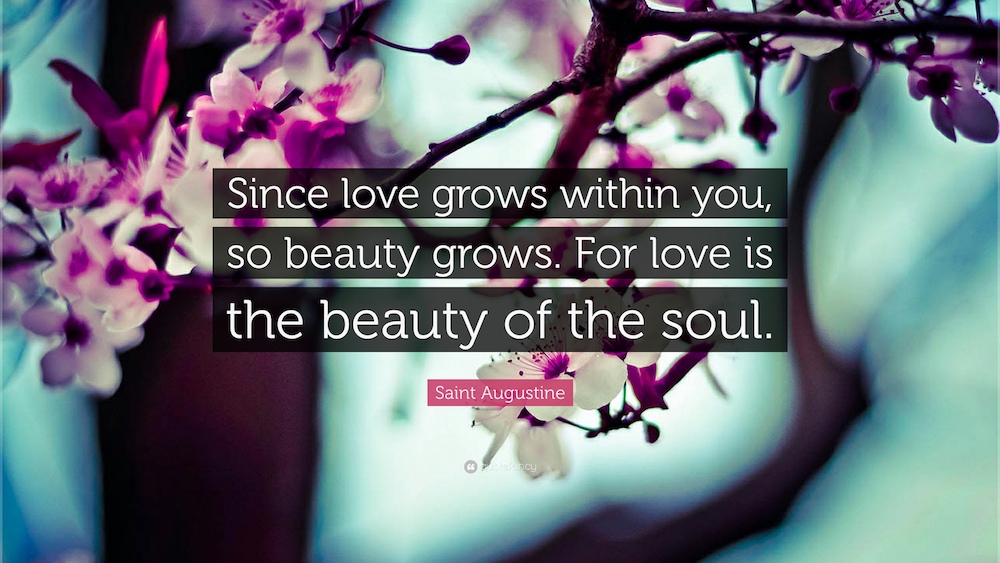
If you are or have ever been mutually in love, chances are you too have seen the world become a little brighter for it. You may know it poetically as “rose-colored glasses”, “butterflies in your stomach”, or “head over heels”, and maybe it’s even gone as far as to make you want to dance or shout with joy. Don’t limit that light to your real-world experiences; let it guide your imagination too! Write about the fluttering of the heart in a moment of passion or how much more vivid colors become through the eyes of a person in love. If writers should write what they know, then why not write about the magic in your life? It can often make for the most beautiful works of art!
2) Being in love helps relieve stress and anxiety.
 Sometimes I don’t even need to be writing romance to be inspired by love. As many writers well know, stress and anxiety can be real creativity killers depending on the kind of stories or poetry you’re trying to write. Unfortunately, the times we’re living in seem to be producing an overabundance of those bad feelings, which can translate into a severe lack of motivation for many of us. Maybe you can turn that anxiety into an aggressive streak of darker stories and poetry if that’s your style, but for writers like me, who favor romance and happy endings, it generally puts me out of the mood to create at all.
Sometimes I don’t even need to be writing romance to be inspired by love. As many writers well know, stress and anxiety can be real creativity killers depending on the kind of stories or poetry you’re trying to write. Unfortunately, the times we’re living in seem to be producing an overabundance of those bad feelings, which can translate into a severe lack of motivation for many of us. Maybe you can turn that anxiety into an aggressive streak of darker stories and poetry if that’s your style, but for writers like me, who favor romance and happy endings, it generally puts me out of the mood to create at all.
So whenever I’m feeling too stressed or anxious to write, I remind myself of how happy my significant other makes me and how good a place I’ve been in since we fell in love. Maybe it goes against the grain of the “tortured artist” stereotype, but I’m sure I do most of my best (or at least most productive) work when I feel emotionally fulfilled and free of tension. That’s not to say one should only ever use positive experiences in their fiction or poetry; after all, conflict is at the heart of every engaging story and many of the most interesting poems, and you absolutely should accept inspiration from your negative experiences too. But if you can, let real-life love motivate you to at least get those words out of your head. Not only is it one of the best treatments against stress and anxiety, it’s also a great cure for writer’s block!
3) Being in love can motivate you to be a better writer.
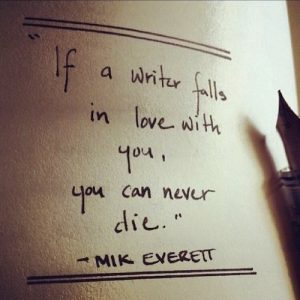 The great thing about love is that when you find it with the right person, you inspire each other to become better people. If nothing else, being in love gives me the motivation I need to be the best version of myself I can be. The amazing feeling of being loved by someone else pushes me to keep improving in the areas of my life that matter most, and few of those areas matter more to me than my passion for writing.
The great thing about love is that when you find it with the right person, you inspire each other to become better people. If nothing else, being in love gives me the motivation I need to be the best version of myself I can be. The amazing feeling of being loved by someone else pushes me to keep improving in the areas of my life that matter most, and few of those areas matter more to me than my passion for writing.
So I keep on giving it my all when I write, because if I deserve that special someone who works hard for both of us and does everything he can to support my passion, then he deserves someone who will work just as hard to help support him through her craft and keep coloring his life with all the art she creates. Relationships are all about teamwork, and if you’re really in love, you’ll want to put in the effort to make yours work. And if that includes being a better writer, then by all means let your love push you to keep reaching for those creative stars!
What about you? Have you ever been in love? How has that love inspired your writing?
6 Mistakes Every Beginning Fiction Writer Makes (and How to Fix Them)
So you’ve just started writing fiction, but you’re not sure you’ve got what it takes. You’re afraid you’ll fail, that you’ll make a ton of writing mistakes and you’ll never be that amazing artist you hope to be someday. Or worse, maybe you think you’ll kill it as soon as you start, and your writing will be so awesome right out of the gate that you’ll never have to practice and improve (only to wonder years down the road why no one ever reads your incredible stories). Whether you suffer from imposter syndrome or unfounded arrogance, your expectations of writing are unreal.
Because guess what? Every writer makes mistakes! That’s how we learn and get better at our craft. But if you want to avoid learning some lessons the hard way (and I don’t blame you), it never hurts to turn to writing resources for help. So for all you blossoming writers out there, here are six common writing mistakes you’re bound to make at least once. Keep an eye out for these the next time you sit down to write!
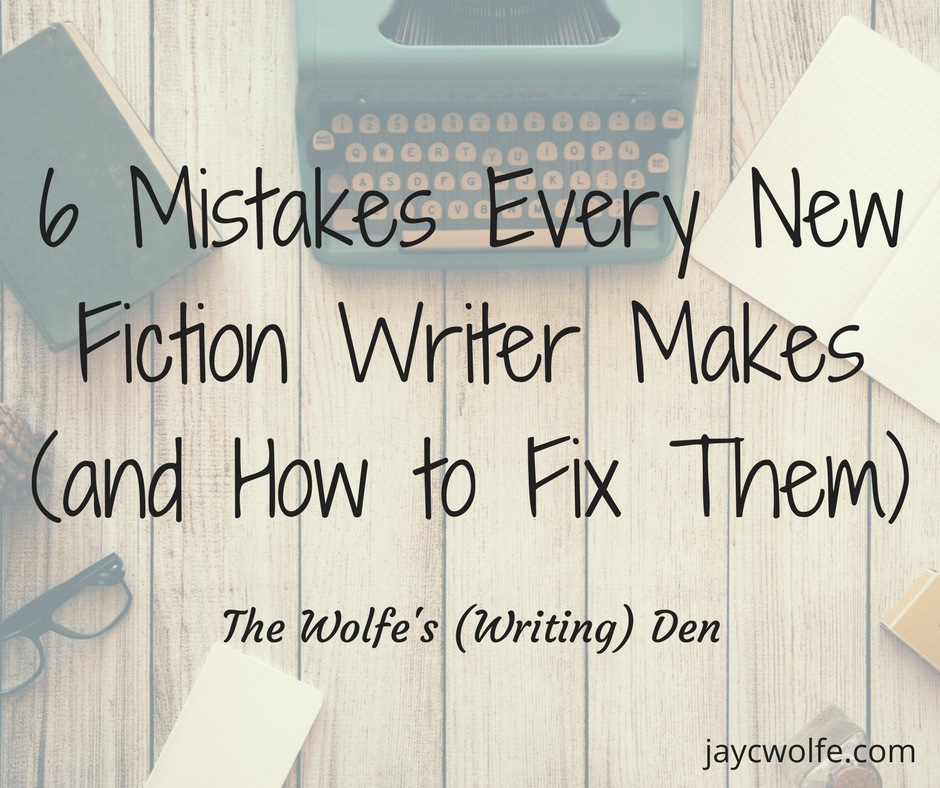
Writing Mistake #1: Stopping at the first draft (i.e. not editing)
The first draft of anything is sh*t. – Ernest Hemingway
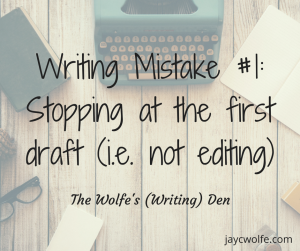 Let’s get this one out of the way first. A common mistake many new fiction writers make (including me when I started) is to write a full story, then set it aside and never touch it again. An important rule of fiction writing: Every piece must go through editing before it’s finished. To be fair, this isn’t as big a deal with private writing, but it’s still good practice for when you’re ready to start sharing your work.
Let’s get this one out of the way first. A common mistake many new fiction writers make (including me when I started) is to write a full story, then set it aside and never touch it again. An important rule of fiction writing: Every piece must go through editing before it’s finished. To be fair, this isn’t as big a deal with private writing, but it’s still good practice for when you’re ready to start sharing your work.
The truth is nothing you write is going to be perfect the first time around. Never assume you’ve created a masterpiece on your first try; even the greatest authors in the world need editors to help them shape their writing into publishable work. Heck, the blog post you’re reading now went through several rounds of revisions before I published it, and it still isn’t perfect!
So don’t stress about making something awesome right away. If anything, let this fact take away the pressure of having to write well all the time. Just write first, worry about making it publishable later. That’s what editing is for.
How to fix this writing mistake
Edit! Edit like your life depends on it, because your story’s life does. Readers don’t appreciate stories because they come out brilliant on the first try, but because the writer took the time to shape that first idea into a polished piece of art. Always make sure your work is worthy of publication before you share it. Need help? You don’t have to do it all alone; that’s what editors are paid for!
Writing Mistake #2: Using flowery language (i.e. purple prose)
Eschew surplusage. – Mark Twain, “Fenimore Cooper’s Literary Offenses” (1895)
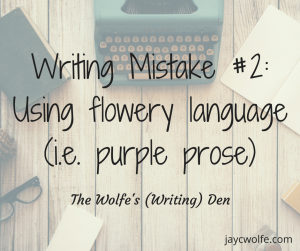 There’s this myth among beginning writers that the best way to be taken seriously is to sound as smart as possible. Maybe you’re insecure about your limited knowledge and vocabulary, so you stuff your stories with fancy words and fluffy sentences, then pat yourself on the back for creating distinguished and eloquent prose. Surely now you’ve proven yourself a great writer, right?
There’s this myth among beginning writers that the best way to be taken seriously is to sound as smart as possible. Maybe you’re insecure about your limited knowledge and vocabulary, so you stuff your stories with fancy words and fluffy sentences, then pat yourself on the back for creating distinguished and eloquent prose. Surely now you’ve proven yourself a great writer, right?
Wrong. While you may think all that fancy writing will give you credibility, you’ve actually just exposed yourself as an amateur. This common writing mistake is known as purple prose, and it can kill your story before it even starts. Counterintuitive as it sounds, using “smart” words and flowery language actually has the opposite effect of driving readers away, because the only people who waste their time reading stories they can’t understand are high school students trying to pass English. Everyone else wants a good story, not a vocabulary lesson.
Purple prose comes in a variety of flavors:
- big, difficult, pretentious words;
- flowery detail;
- too many adjectives and adverbs;
- said bookisms (only using words other than “said” as dialogue tags); and
- exaggerated sentiment (trying to “force” readers to feel certain emotions).
If you’re guilty of making any of these mistakes, stop and rewind. When you edit, make every effort to weed out the purple and strip your story down to the bare bones. You may have trouble getting used to this style, but in time you’ll find that concise and direct writing is the most effective form of storytelling.
How to fix this writing mistake
Replace big words and phrases with simpler ones, remove unnecessary adjectives, and cut out details that do nothing for your story. The idea is to sound as natural and direct as possible so you’ll connect with your readers. When in doubt, read your work out loud; if a word or phrase sounds strange, like something you’d never say in real life, delete it or replace it with a more common alternative.
Writing Mistake #3: Getting crazy with the punctuation!!!
Jake: Ok, I’m excited. I just don’t happen to like exclamation points.
Elaine: Well, you know, Jake, you should learn to use ’em! Like the way I’m talking right now, I would put exclamation points at the ends of all of these sentences! On this one! And on that one!
– Seinfeld (Season 5, Episode 4 – The Sniffing Accountant)
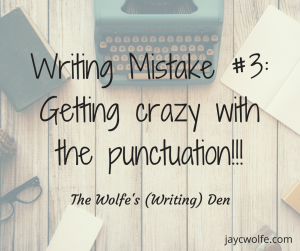 Of all the ridiculous situations in Seinfeld‘s nine-season run, few top the time Elaine screwed up her relationship over punctuation. The irony: her boyfriend was a writer whose book she was editing, and he was probably right not to use those exclamation points.
Of all the ridiculous situations in Seinfeld‘s nine-season run, few top the time Elaine screwed up her relationship over punctuation. The irony: her boyfriend was a writer whose book she was editing, and he was probably right not to use those exclamation points.
When writing fiction, punctuation is something you don’t want to mess up, because this mistake translates as lazy or incompetent writing. Trust me on this: As much as a scene calls for over-the-top excitement, you don’t need three exclamation points to get your point across. When you overuse punctuation, you’re conveying one of two messages to your reader:
- you don’t trust your writing enough to express emotion through words alone, or
- you don’t trust the reader to grasp the emotion in your words without help.
Either way, it doesn’t make you look good. Writers should always take care not to patronize their audience, and one of the easiest ways to do that is by using exclamation points and other punctuation marks where you don’t need them. That’s not to say you should avoid them altogether; you just shouldn’t use them as a crutch. Instead, trust your words to convey the right messages and emotion on their own. Remember that punctuation is simply an organizational tool; the focus should always be on your words.
How to fix this writing mistake
Stick to normal punctuation. Use exclamation points sparingly, avoid multiple punctuation, and know how to use commas, apostrophes, colons, semicolons, and hyphens correctly. When in doubt, turn your work over to a proofreader.
Writing Mistake #4: Writing dialogue that falls flat
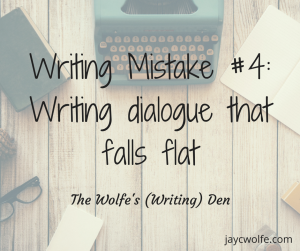 I confess: even after writing fiction for nearly my whole life, I still have trouble with dialogue. Maybe it’s because I’m shy and have little experience talking to people, but this seems to be my Achilles heel when it comes to writing stories. If you feel this is your weak point too, don’t worry, you’re not alone. In fact, dialogue is so hard to get right that this writing mistake could take up its own blog post, but for the sake of brevity, let’s focus on the main point.
I confess: even after writing fiction for nearly my whole life, I still have trouble with dialogue. Maybe it’s because I’m shy and have little experience talking to people, but this seems to be my Achilles heel when it comes to writing stories. If you feel this is your weak point too, don’t worry, you’re not alone. In fact, dialogue is so hard to get right that this writing mistake could take up its own blog post, but for the sake of brevity, let’s focus on the main point.
In a nutshell, dialogue is difficult to write well because it’s not quite speech and not quite narrative, but instead constitutes a class of its own. We think differently when we speak than when we write, so it takes a lot of practice to master the balance between both. Writing good dialogue involves removing the boring parts of everyday speech—pauses, ums, stutters, etc.—and refining it to a form that reads naturally while still conveying information relevant to the story. And while this may sound simple on the surface, it can take years of practice to learn how to:
- cut out the unnecessary parts of speech,
- make characters sound natural,
- give each character a distinct voice, and
- use a conversation to move the story forward.
So don’t feel bad if you’ve been writing for a long time and still struggle with this technique. Just keep practicing, and you’ll be writing good dialogue before you know it.
How to fix this writing mistake
Read your dialogue out loud and see how believable it sounds. If a phrase or sentence sounds odd, try to rephrase it in a way that a real person with your character’s background would say it. If you find this difficult, start paying attention to how people talk and incorporate more of their speaking styles into your writing (but not too much!). Condense dialogue as much as possible and make sure it always moves the story forward.
Writing Mistake #5: Telling more than showing
Don’t tell me the moon is shining; show me the glint of light on broken glass. – Anton Chekhov
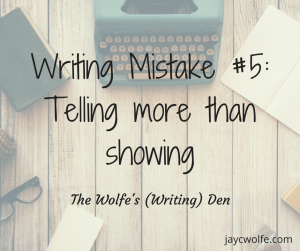 From creative writing courses to author blogs, we see this writing advice everywhere: show, don’t tell. This means that instead of outright stating a fact, you should give clues that help your readers figure the fact out for themselves. This technique is designed to create an immersive and engaging experience for your readers, and will often make the difference between a good narrative and a great story.
From creative writing courses to author blogs, we see this writing advice everywhere: show, don’t tell. This means that instead of outright stating a fact, you should give clues that help your readers figure the fact out for themselves. This technique is designed to create an immersive and engaging experience for your readers, and will often make the difference between a good narrative and a great story.
Granted, there will be times when telling is necessary because showing is impossible—such as telling exactly what a character is thinking or how an event has changed them internally—but conveying a simple idea or action in vivid imagery will add emotion and depth to your story. Instead of focusing on the idea itself, understand what makes that idea apparent and use those details to color the narrative. If a character is sad, describe the tears on her face or the way she hangs her head when someone talks to her. If it’s raining, describe your character hopping over puddles as he runs to the bus stop under a wet umbrella. Wherever possible, set the scene and let your audience fill in the blanks.
Good storytelling is not just telling people a story but bringing them on an emotional journey with you. So the next time you feel compelled to tell readers what’s going on, take a step back and assess how much you should tell and how much you can show instead. Master this balance and you’ll be one step closer to writing truly amazing stories!
How to fix this writing mistake
Read your story back and determine where the narrative falls flat. Highlight the passages that tell you something (e.g. “she was happy”, “it was a clear day”), then rewrite them in a way that will show you the same thing (e.g. “her laughter rose above the din”, “sunlight gleamed off the surface of the water”). Read through the story again and maintain the changes that make the narrative stronger.
Writing Mistake #6: Not writing!
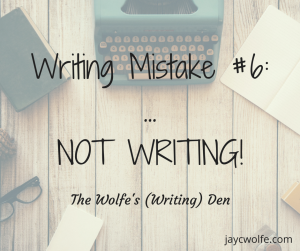 Yes, believe it or not, this is a common problem for beginning and advanced writers alike: not writing. Sounds counterintuitive, right? I mean, how can you be a writer if you don’t write?
Yes, believe it or not, this is a common problem for beginning and advanced writers alike: not writing. Sounds counterintuitive, right? I mean, how can you be a writer if you don’t write?
That’s just it: you can’t. But too many writers get so caught up in brainstorming, researching, self-editing, and worrying their work isn’t good enough that they don’t set aside enough time to actually write. It should go without saying that writing is the most important part of… well, writing, but most of the time, it’s just not that easy. When you sit for too long without doing any work, you succumb to deep-seated fears of failure and rejection, and before you know it, you stop writing before you even start.
So if you find yourself stuck in writing limbo, do yourself a favor and close your mind off to all your fears. Don’t stress about any of the other aspects of writing; just sit down and write. I know this is much easier said than done (speaking from experience), but once you get those words flowing, everything else will start to fall into place. Remember, unless you actually write, all those other steps are just a waste of time. Don’t be an “aspiring writer”; get out there and write!
How to fix this writing mistake
Write! Don’t worry about researching or editing or publishing or dealing with criticism yet. Just write. The rest will follow.
What about you? Are you guilty of making these writing mistakes? What other mistakes would you add to this list?
Thinking of Self-Publishing a Book? You’ll Want to Watch This Live Webinar Tonight!
Do you dream of writing a book but have no idea where to start? Have you already written your first draft but need help with editing? Is your manuscript finished but you can’t seem to find an agent or publisher who will help you get it to print? Have you published a book yourself but are struggling to make it a bestseller? Or are you just curious about how to navigate the world of self-publishing?
If you answered “yes” to any of these questions, then drop everything and tune in tonight at 9 pm EST / 6 pm PST to Chandler Bolt’s live Self-Publishing School webinar: How To Go From Blank Page to Published Author In 90 Days!
What is Self-Publishing School?
Who is this Chandler Bolt, you ask? He’s the creator of Self-Publishing School, an online course that guides you through the entire process of self-publishing a book, from coming up with an idea to achieving bestseller status on Amazon! The course is designed to streamline the self-publishing process into a 90-day program, but you can complete it as quickly or slowly as you want; an SPS membership is a one-time purchase that gives you lifetime access to the course!
In tonight’s workshop, Chandler will talk about:
- the 3-step system to write, publish, and launch a bestselling book in 90 days;
- the dream-killing myths about becoming an author that are holding you back from success;
- how to find a book idea in under an hour;
- how to leverage your book to grow your authority, income, and business;
- case studies of successful Self-Publishing School students; and
- how he made $4,000/month from his first book.
And don’t be alarmed, fiction writers: while much of it seems to be geared toward nonfiction, this course is for all types of authors. Self-Publishing School does have resources specific to fiction authors, so be sure to take advantage of them if you choose to enroll!
You’ll learn much more about Chandler and Self-Publishing School by watching the webinar tonight. I’m sure it will be worth your time; it was certainly worth mine!
My Experience with Self-Publishing School (So Far)
So it’s time I let you all in on a secret: I’m finally on my way to self-publishing my first novel! I’ve been longing to write my debut novel for ages, but being the worst procrastinator ever, I never really got past the planning stage. After signing up for Self-Publishing School a few months ago, I wrote a 100,000-word fantasy novel in less than two months! I’m now in the editing phase (which may take even longer, but I’m more excited than ever), and I have a myriad of resources at my disposal for the upcoming stages of publishing and launching the book.
Aside from a lifetime-access 90-day guide, the course offers one-on-one coaching, outsourcer listings for editors and book cover designers, weekly live Q&A hangouts, and a friendly community of fellow students who all support each other through the self-publishing journey. Honestly, the community is my favorite part; writing a book can be such a lonely and confusing process, so it’s good to connect with other authors who know the struggles of self-publishing and help each other launch their books successfully!
Based on my experience so far, I’d highly recommend Self-Publishing School to any writer who’s been dreaming of writing a book for years but hasn’t yet made the leap. Don’t worry, though, there’s no need to commit yet. Just check out the live webinar tonight and then see if SPS is a good fit for you. Only you can decide if you’re ready to invest in your book and your future!
The webinar starts tonight, August 9th, at 9 pm EST / 6 pm PST! Be sure to reserve your spot now! Don’t miss it!
Disclaimer: this post contains affiliate links for Self-Publishing School. All opinions expressed here are my own. The webinar is free, but I will get a commission if you choose to enroll in SPS. Thanks for supporting my blog!
What If? Writing Prompts: Mystery / Suspense V
Here’s a funny coincidence: I was recently looking through my archives of “What If?” Writing Prompts when I noticed that the last time I shared a set of mystery and suspense prompts was exactly a year ago tomorrow! So while I’m catching up on my blogging, I decided it would be fun to share a new batch of prompts in this genre, one year apart. See what mysterious stories you can create from these ideas, and feel free to add more of your own! Have fun!
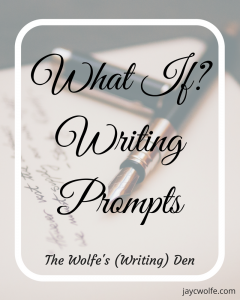 What if… you discovered that your best friend was actually a spy for a hostile foreign power?
What if… you discovered that your best friend was actually a spy for a hostile foreign power?
What if… you found strange messages in your private journals and notebooks that you don’t remember writing?
What if… you found alive and well a celebrity that the whole world thought was dead?
What if… an object in your house kept changing position even though you never touched it?
What if… a close friend or relative thought to have committed suicide left you a message in their will asking you to track down their killer?
Good luck writing some more mysterious and suspenseful stories!
If you have any “What If?” writing prompt suggestions (for any theme), please feel free to share them in the comments below. Ideas I like may be featured in future “What If?” posts, with full credit and a link to your blog (if you have one)! Also, if you’ve written a piece based on an idea you’ve found here, be sure to link back to the respective “What If?” post. I would love to see what you’ve done with the prompt! Thank you!
16 More Wordy Phrases You Should Simplify in Your Writing
Remember that list I shared a while back of wordy phrases you should edit out of your writing? Well, there’s a lot more where those came from! The Clarity game in the Elevate – Brain Training app is full of long and passive phrases that can easily be reduced to single, clearer words. It never hurts to learn how to simplify as many as you can!
So for your reference, here are 16 more wordy phrases you should simplify when editing your writing. Enjoy!
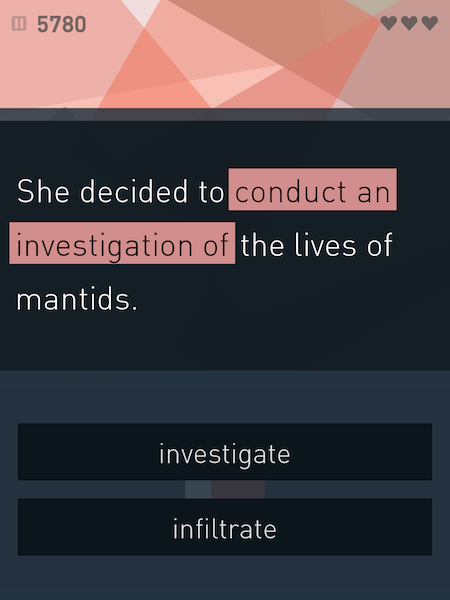 1) Able to: indicates that someone has the ability to do something. Simplify “able to” to “can”.
1) Able to: indicates that someone has the ability to do something. Simplify “able to” to “can”.
2) An adequate number of: a long phrase referring to an appropriate amount of something. Simplify “an adequate number of” to “enough”.
3) An appreciable number of: indicates a large amount of something. Simplify “an appreciable number of” to “several”.
4) An estimated: indicates an approximate number of something. Simplify “an estimated” to “about”.
5) By reason: refers to why something happened. Simplify “by reason” to “because”.
6) Conduct an investigation: passive form of the verb “investigate”. Simplify “conduct an investigation” to “investigate”.
7) Extend an invitation to: passive form of the verb “invite”. Simplify “extend an invitation to” to “invite”.
8) Have an adverse effect on: passive phrase meaning to produce an undesirable outcome. Simplify “have an adverse effect on” to “set back”.
9) In addition to: passive phrase indicating something extra. Simplify “in addition to” to “besides”.
10) In anticipation of: passive phrase referring to something done prior to an event. Simplify “in anticipation of” to “before”.
11) In connection with: a longer way to say concerning. Simplify “in connection with” to “about”.
12) It is crucial that you: a long phrase indicating something that is imperative. Simplify “it is crucial that you” to “you must”.
13) Made a statement that: lengthy phrase indicating that someone conveyed information. Simplify “made a statement that” to “said”.
14) Make reference to: passive phrase that indicates something being referenced. Simplify “make reference to” to “reference”.
15) Point of view: indicates how someone interprets a situation. Simplify “point of view” to “perspective”.
16) Realize a savings of: lengthy phrase that indicates an amount saved. Simplify “realize a savings of” to “save”.
Are you guilty of using any of these phrases? What other wordy phrases would you add to this list?
What If? Writing Prompts: Fantasy / Science Fiction VII
So lately I’ve been playing around with Canva, and I’ve come up with a new image for my “What If?” Writing Prompts segment! To be honest, I’ve felt for a while that it was time for a change, so today I’m debuting this new “social media friendly” image with a fresh set of fantasy and science fiction prompts! See what new stories you can write based on these ideas, and feel free to add more of your own! Enjoy!
 What if… in the future, wars were waged entirely by artificial intelligence with no human input?
What if… in the future, wars were waged entirely by artificial intelligence with no human input?
What if… you died, only to wake up and discover you’d been living in a virtual reality all along?
What if… you switched bodies with an extraterrestrial and had to find a way to switch back before it could destroy your home?
What if… you spent so much time in virtual reality that you couldn’t tell the difference between the real world and the virtual world anymore?
What if… you brought home a mysterious rock you found… that turned out to be a dragon egg?
Good luck writing more stories in science fiction and fantasy!
If you have any “What If?” writing prompt suggestions (for any theme), please feel free to share them in the comments below. Ideas I like may be featured in future “What If?” posts, with full credit and a link to your blog (if you have one)! Also, if you’ve written a piece based on an idea you’ve found here, be sure to link back to the respective “What If?” post. I would love to see what you’ve done with the prompt! Thank you!
The Halfway Point: Progress Report on My 2017 Reading Goals
Yes, we’re already halfway through 2017! Amazing, isn’t it? Now that we’re in July, it’s once again time to assess our progress on our reading goals for the year. I’ll go first!
My 2017 Reading Goals
Like I did last year, I set a goal of ten books for the Goodreads 2017 Reading Challenge, a reasonable goal for a relatively slow reader like me. So far, I’ve met half my goal for the year! I’ve also noticed a trend of more books from my to-read list in January actually reaching my have-read collection, as well as more nonfiction books making the list (thanks in no small part to my pursuit of a freelancing career).
I plan to write a more detailed report on my 2017 reading goals at the end of the year. In the meantime, here’s a brief review of the books I’ve read so far, am currently reading, and still plan to read:
Books I’ve read so far
- The Hunger Games, by Suzanne Collins
- A Game of Thrones, by George R.R. Martin
- I Am Pusheen The Cat, by Claire Belton
- High Performance Paperback, by Ray Brehm and Jim Molinelli
- Fahrenheit 451, by Ray Bradbury
Books I’m currently reading
- 1984, by George Orwell
- Ready Player One, by Ernest Cline
- You Are A Writer, by Jeff Goins
- The Business of Writing & Editing, by Sagan Morrow
Books I still plan to read
- Wuthering Heights, by Emily Brontë
- Arrival, by Ted Chiang
- StarTalk, by Neil deGrasse Tyson
Your turn! Any reading goals you’re still working toward this year? Which ones have you completed so far?
What If? Writing Prompts: History VI
Yesterday was Independence Day in the US, so here’s a special set of “What If?” Writing Prompts to celebrate! This week’s batch features more prompts in the history genre, specifically American history! See what historical tales you can spin from these ideas, and feel free to add more of your own! Have fun!
 What if… every state in the US were its own country?
What if… every state in the US were its own country?
What if… the “Wild West” hadn’t been settled in the 18th century?
What if… the stock market hadn’t crashed in 1929?
What if… the Japanese attack on Pearl Harbor had never happened?
What if… the US hadn’t undergone McCarthyism in the ’50s?
Good luck writing your own stories about American history!
If you have any “What If?” writing prompt suggestions (for any theme), please feel free to share them in the comments below. Ideas I like may be featured in future “What If?” posts, with full credit and a link to your blog (if you have one)! Also, if you’ve written a piece based on an idea you’ve found here, be sure to link back to the respective “What If?” post. I would love to see what you’ve done with the prompt! Thank you!
3 Reasons You Should Write Fiction in Active Voice
Anyone who either is or has worked with an editor has had to deal with the common writing issue of active voice vs. passive voice. Any and every editor worth their salt will tell you to favor active voice, while writing in passive voice is just another bad habit you’ll have to learn to break. But why? What is active voice and what makes it so much better than its passive counterpart?

Finally, a fun way to check for passive voice!
(Image source: Grammarly Blog)
In a nutshell, an active voice sentence is when the subject does an action to the object, while passive voice is when the subject has an action done to it by the object. Both voices can be used to convey the same message, yet writing tips often advise favoring the former over the latter. This is especially true for fiction, which relies heavily on not only keeping readers engaged for an entire story, but evoking their emotions as you guide them through the world of your narrative.
So to help you create stronger and more appealing fiction, here are three reasons you should favor active over passive voice. Good luck!
1) Active voice is clearer, stronger, and more concise.

The longer you’ve been writing, the more you appreciate concise and direct language. In this modern-day barrage of knowledge, information that’s delivered and processed quickly tends to have a greater impact, so the fewer words you can use to convey a message, the better. One way to achieve this is by replacing passive voice statements with their active counterparts. Observe the difference:
Active: She loved him, but he rejected her.
Passive: He was loved by her, but she was rejected by him.
Notice how the active voice sentence is simpler yet much more powerful. Written concisely, the feelings of love and rejection between these characters become prominent and impactful, whereas the longer sentence appears convoluted and awkward, despite having the same meaning. By using fewer words, you can keep your writing direct and make your narrative stronger, which will result in more effective prose. Why let it be done by you when you can just do it?
2) Active voice sounds more natural.
Think about your favorite story, that book you enjoy so much you could read it over and over. Now think about why you love it. If “it speaks to me” is one of the first reasons to come to mind, then you’ve just made an excellent point to support active voice.
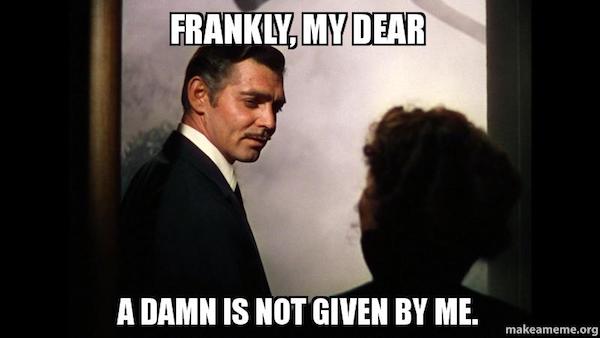
The types of writing that most resonate with us are the ones that sound familiar, that is, that mimic the way we speak. Active voice achieves this far more easily than passive voice because most of our speech is active. For example, when bragging to someone about an achievement, you wouldn’t tell them, “That was done by me”; you would say, “I did that!” Similarly, narrative should be as direct and “active” as spoken words. You want to draw your readers in and keep them hooked to the last word, and what better way to achieve that than by speaking directly to them?
3) Active voice keeps the momentum going.
One of the keys to good storytelling is to always keep the action moving forward. Even slower descriptive scenes should read smoothly, with new and relevant information in every line. Passive voice makes this difficult, as it has a way of dragging the pace of a story with unnecessary words and phrases. Don’t give your readers a motive to put your book down!
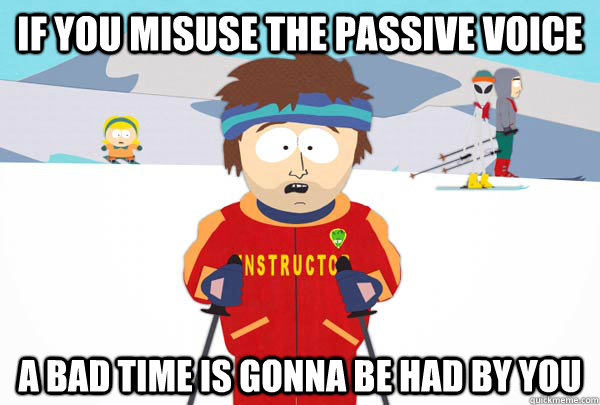
You don’t want your readers to have a bad time, do you?
Keep your prose clean by limiting passive voice to the few instances in which it works best:
- when you can’t say who performed the action;
- when you want to emphasize the action itself; and
- when you’re highlighting a general truth.
In all other cases, active voice will better maintain the momentum in your narrative, keeping your readers engaged through each new action until the end of the story. A good example of why this works is the Hero’s Journey: the hero answers the call to adventure, faces trials, confronts a great ordeal, collects the reward, and returns from his or her quest a new person. At every stage, the hero does something that leads to something else, standard cause and effect that propels the action forward. Apply this technique to your prose and the active voice will accomplish its most important goal: to make your writing active and interesting!
Perhaps you tend to overuse the passive voice without realizing (I know I’m still guilty of this), but luckily it’s an easy problem to fix. So the next time you edit one of your stories, keep an eye out for unnecessary passive sentences and replace them with their active parallels. Your readers will appreciate the effort!
What are your thoughts on active and passive voice? Are you guilty of not using active voice as frequently as you should?
3 Lessons You Can Only Learn from Your Grandmother
Creative inspiration can come from anywhere, and some of the best comes from the people you love most: your family. Every family member has their own unique qualities and abilities to contribute to your stories, but one in particular stands out for how much unconditional love and care she showers on you: your grandmother! Grandmas have plenty of love to give their grandchildren, so they can serve as great inspiration for grandparent characters in your stories!
So to honor someone special in my life, today’s post features three lessons you can only learn from your grandmother. Enjoy!
1) Grandchildren are meant to be spoiled.
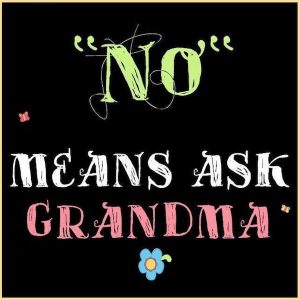 If there’s one thing grandparents are experts at, it’s spoiling their grandkids. Every family visit to my grandmother’s house includes platefuls of delicious homemade food and lots of fussing over us, mostly about how we’re “not eating enough”. She also makes a point of complimenting her granddaughters and telling us how much she adores us, and we can’t help but smile and tell her how much we love her too!
If there’s one thing grandparents are experts at, it’s spoiling their grandkids. Every family visit to my grandmother’s house includes platefuls of delicious homemade food and lots of fussing over us, mostly about how we’re “not eating enough”. She also makes a point of complimenting her granddaughters and telling us how much she adores us, and we can’t help but smile and tell her how much we love her too!
So if you’re writing a grandmother character, be sure to make her as doting as possible of her grandchildren. Have her share her best cooking with them, fuss over them without end, and constantly let them know how much she loves them and that they’re the greatest joys in her life. Grandmothers love spoiling their grandchildren, but that’s fine because we love being spoiled!
2) Nobody cooks like Grandma!
Going back to those “platefuls of food”, one thing I love about visiting my grandma is getting to enjoy the delicious snacks she makes! They’re something we always look forward to when we visit, since we get to enjoy them almost exclusively at family gatherings for special occasions. Her cooking is always a treat, so I’m glad her gift has passed on to my mother (and hopefully someday to me)!
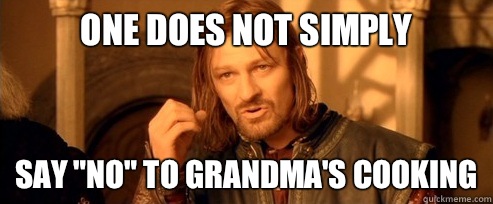
When writing fictional characters who are grandmothers, it’s common to give them the skills to cook and bake delicious treats, especially for their grandchildren! Remember, nobody cooks quite like Grandma does, so for Heaven’s sake, learn those family recipes! You’ll definitely miss them otherwise.
3) No matter how old you get, your grandmother will always see a child in you.
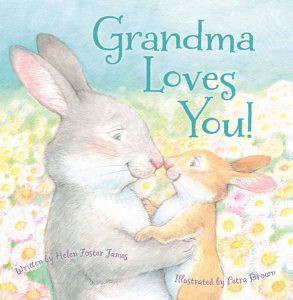
Grandma Loves You, by Helen Foster James
Every time my family and I see my grandma, some story from when I was little inevitably comes up. My grandmother loves reminiscing about when her grandchildren were small enough to be picked up and were doing something adorable every minute, and I can’t really blame her. I too love to remember the good old days of childhood; in fact, my inner child is one of the main reasons I’m a writer today!
If one of the important characters in your story is a grandmother, a good touch is to give her excellent storytelling abilities, as much of her youth as of more recent times when her grandchildren were little. Grandmothers enjoy telling stories of the people they love most, so grandchildren will naturally be a favorite subject for them! And if nothing else, telling your own story inspired by your grandmother may be the best way to show her how much you love her too!
What lessons have you learned from your grandmother? What other lessons would you add to this list?
Dedicated to my grandmother, whose love has always been a wonderful inspiration. Happy Birthday, Grandma! I love you!

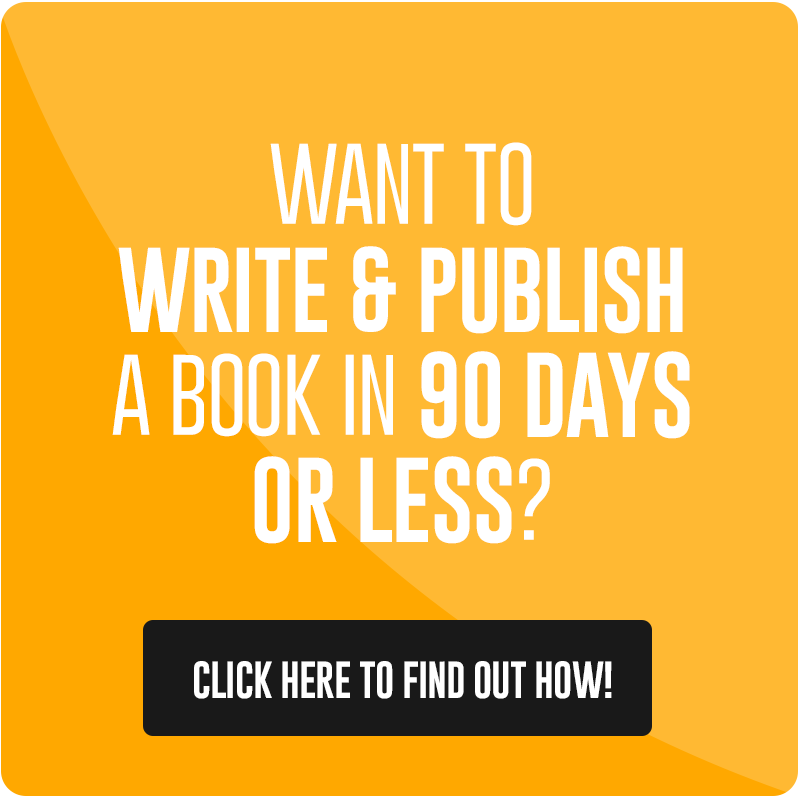
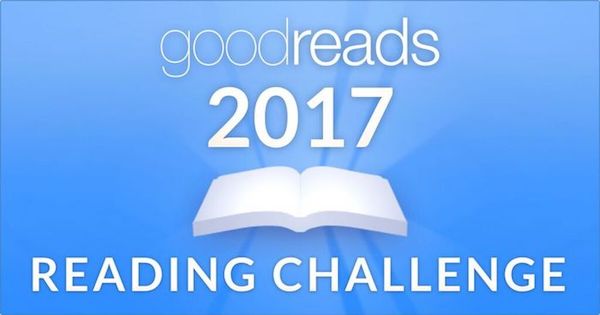

Recent Comments